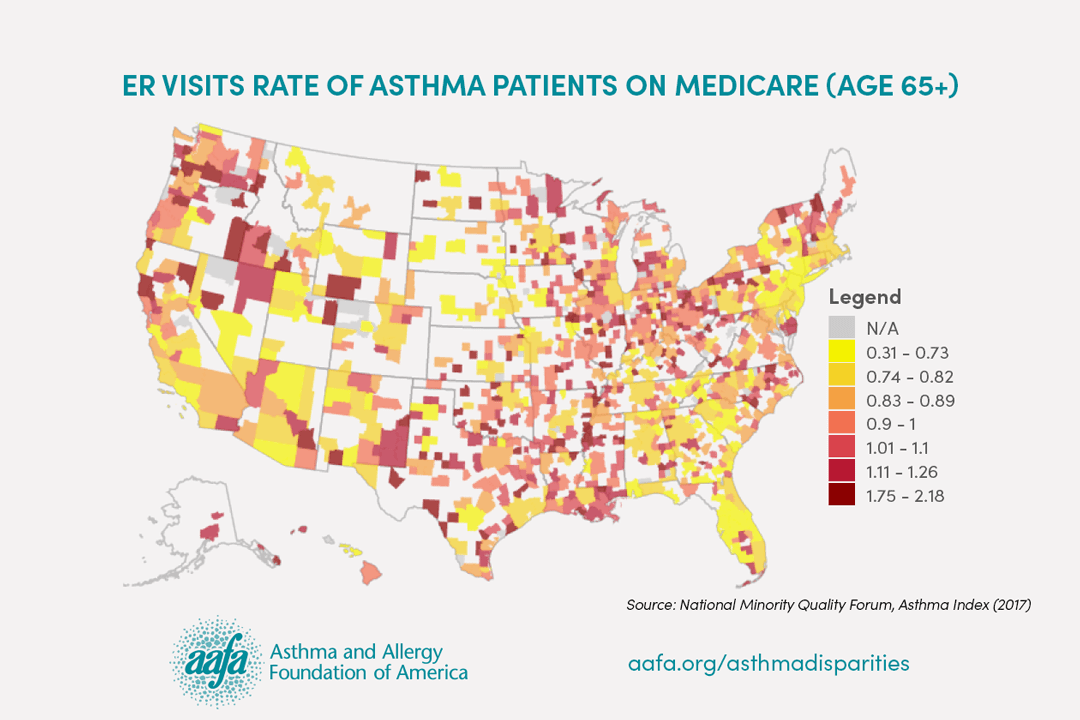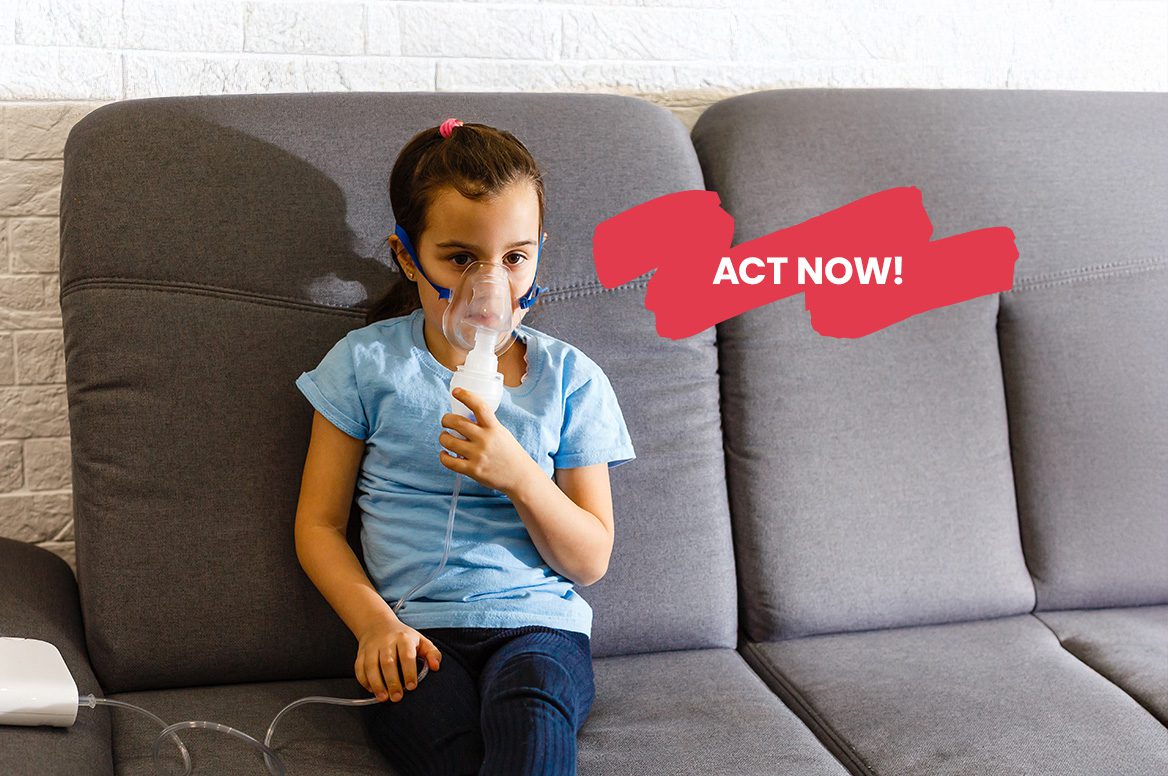Asthma
Asthma in Older Adults
Asthma is common in adults ages 65 and older. Around 7.2% of older adults in the United States have asthma.1 But asthma is riskier for older adults than younger people because they face special challenges. Some older adults with asthma have had it since childhood. Others developed asthma as adults.
What Are Common Asthma Signs and Symptoms in Older Adults?
The signs and symptoms of asthma in older adults are the same as asthma symptoms seen in other age groups.
Common signs and symptoms of asthma in older adults include:
- Shortness of breath
- Cough
- Chest tightness or pain
- Wheeze (a whistling sound when you breathe)
- Waking at night due to asthma symptoms
- A drop in your peak flow meter reading (if you use one)
- Limited ability to do physical activity
How Do Doctors Diagnose Asthma in Older Adults?
Many older adults with asthma develop it during their adult years. Doctors call this adult-onset asthma or late-onset asthma.
To diagnose asthma in an older adult, a doctor will ask about medical history and your family history, do a physical exam, and do lung function tests, if possible.
Asthma can be harder to diagnose in older adults because they often have other health issues. Because of this, asthma is underdiagnosed and undertreated in this age group. Changes in aging lungs can also make asthma worse.
Issues that can make asthma harder to diagnose in older adults include:
- Trouble doing lung function tests
- Medicines for other conditions
- Other age-related health issues that can be confused with asthma, such as:
- Chronic obstructive pulmonary disease (COPD)
- Other lung diseases (such as emphysema)
- Congestive heart failure
- Paroxysmal arrhythmias (a type of irregular heartbeat)
- Acid reflux disease (GERD)
Some medicines that older adults use can have side effects that can cause asthma-like symptoms or make asthma worse. The following medicines can cause airway tightening (bronchospasm) or can worsen asthma:
- Heart medicines, such as beta blockers, ACE inhibitors, and some diuretics
- Cholinergic agents that are used to treat glaucoma, Alzheimer’s disease or dementia, and some gut and bladder conditions
- Aspirin and non-steroidal anti-inflammatories (NSAIDs)
How Do You Treat Asthma in Older Adults?
The treatment for asthma in older adults involves:
1. Avoiding or reducing asthma triggers. To do this, you need to know what triggers your asthma and then take steps to manage those triggers. Triggers can include:
- Viral respiratory infections (such as the flu and RSV)
- Exercise and physical activity
- Cold and dry air
- Big temperature and weather changes
- Allergens (like pet dander, dust mites, pollen)
- Strong odors, irritants, chemicals
- Smoke (wildfire, cooking, cigarettes, vaping)
- Medicines (see list above)
- Indoor and outdoor air pollution
- Strong emotions
Once you know your triggers, you can control or manage them. (Use AAFA’s Healthier Home Checklist to help you.)
2. Taking asthma medicines as prescribed. You may need to take medicines daily, as needed, or both. This will depend on how severe your asthma is and the type of medicine you take. Some asthma medicines work to control (or prevent) inflammation (swelling) in your airways. Other asthma medicines relieve the muscles that tighten and squeeze your airways and aim to stop symptoms after they begin. (Learn more about the different types of asthma medicines and how they work.)
3. Following an Asthma Action Plan. It is important to know the signs and symptoms of asthma and when and how often to take your medicines. Ask your doctor or health care provider to help you create an Asthma Action Plan. Remember to review this plan with your health care provider to make sure it is effective and up to date.
4. Taking care of your overall health. There are other medical conditions or illnesses that can make your asthma worse. To keep your asthma under control, you need to take care of other parts of your health, too. Examples include allergies and acid reflux. Doctors will also consider other health conditions you have and all the medicines you currently take.
What Are the Challenges of Asthma in Older Adults?
Older adults have more asthma symptoms and deaths from asthma than younger people.2,3,4 They are also less likely to get the proper diagnosis and treatment they need. They also face socioeconomic issues that may affect their asthma management.
Older adults may struggle with using asthma inhalers due to arthritis or not being able to breathe in well enough to get the medicine from the inhalers into the lungs. Your doctor may prescribe a nebulizer, a breathing machine that turns asthma medicine into a mist that you can easily breathe in. The nebulizer may be easier to use.
If prescribed by a doctor, your insurance company may cover the cost. You can also buy a nebulizer from a pharmacy or durable medical equipment (DME) company. Nebulizers bought online without a prescription may not meet the standards required by the Food and Drug Administration (FDA). Talk with your doctor about which nebulizer is best for you.
Challenges older adults face when managing asthma:
- Changes in aging lungs
- Reduced mental and motor skills
- Fears and confusion about treatment
- Costs of medicine
- Limited income
- Managing other chronic health conditions
- Not included in clinical trials (treatments may not work as well for this age group)
Greater asthma disparities exist in older age groups. The impact of asthma is higher among Black, Hispanic, and low-income adults ages 65 and older. Black and Hispanic older adults go to the emergency room for asthma more than 1.5 times than older white adults.5 They also are more likely to have gaps in health insurance coverage.

Medical Review: July 2024 by John James, MD
Closed
References
- Centers for Disease Control and Prevention. (2023, May 10). Most recent national asthma data. Centers for Disease Control and Prevention. https://www.cdc.gov/asthma/most_recent_national_asthma_data.htm
- Boulet, L.-P. (2016). Asthma in the Elderly Patient. Asthma Research and Practice, 2(1). https://doi.org/10.1186/s40733-015-0015-1
- Khosa JK, Louie S, Lobo Moreno P, Abramov D, Rogstad DK, Alismail A, Matus MJ, Tan LD. Asthma Care in the Elderly: Practical Guidance and Challenges for Clinical Management – A Framework of 5 “Ps”. J Asthma Allergy. 2023 Jan 5;16:33-43. doi: 10.2147/JAA.S293081. PMID: 36636705; PMCID: PMC9829983.
- Dunn, R. M., Busse, P. J., & Wechsler, M. E. (2018). Asthma in the elderly and late-onset adult asthma. Allergy, 73(2), 284–294. https://doi.org/10.1111/all.13258
- National Minority Quality Forum. (2019). National Minority Quality Forum asthma index. SHC Holdings LLC. Retrieved July 17, 2024, from asthma.nmqf.us













